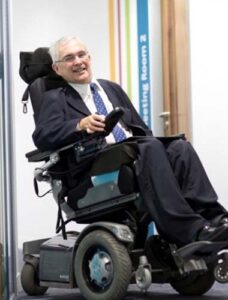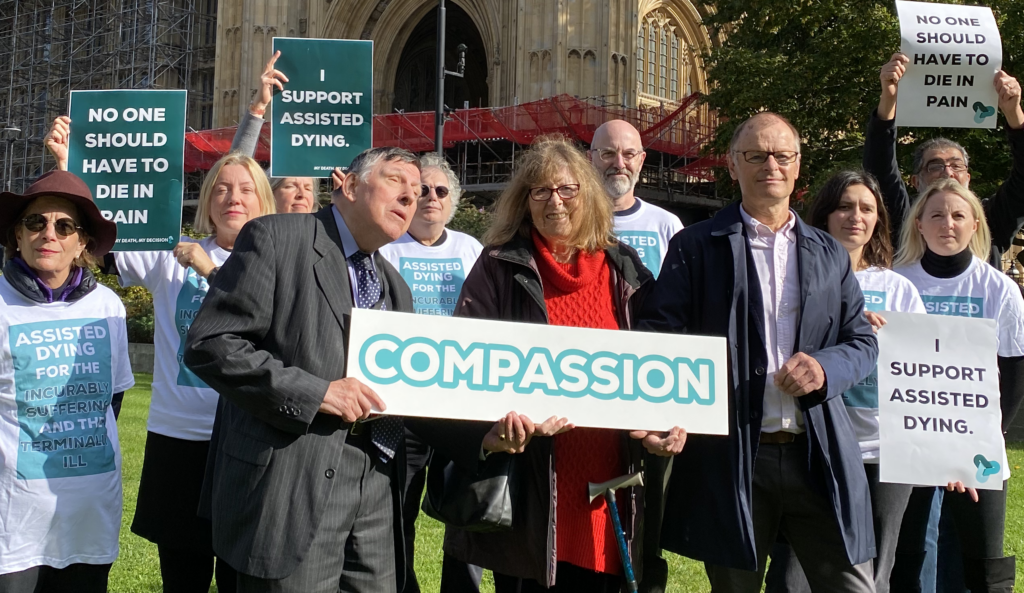 The Health and Social Care Committee’s assisted dying inquiry has published its final report.
The Health and Social Care Committee’s assisted dying inquiry has published its final report.
My Death, My Decision is a grassroots campaign group with over 3,000 supporters that wants the law in England and Wales to allow those who are terminally ill or intolerably suffering the option of a legal, safe, and compassionate assisted death.
We were one of the core groups that campaigned for an inquiry into this vital issue. Now the report has been published, here is everything you need to know about it and what it means for you.
No explicit call to change the law, but a foundation for change.
We were disappointed to see that the report contained no direct recommendations for a change in the law. In our view, this was a missed opportunity to push the debate forward. However, it clearly outlines the evidence and should be used as a roadmap for the next parliament to legislate on assisted dying.
Palliative care is improved by the introduction of assisted dying legislation.
The assisted dying inquiry had a considerable focus on palliative care. It was the main question they asked on their call for evidence and it was a core reason why they visited the US state of Oregon, which has had an assisted dying law since 1997. They visited a hospice in Clapham too.
One of the biggest conclusions of the report is:
‘In the evidence we received, we did not see any indications of palliative and end-of-life care deteriorating in quality or provision following the introduction [of assisted dying]; indeed the introduction of [assisted dying] has been linked with an improvement in palliative care in several jurisdictions.’
We are encouraged to see that parliament has finally understood that palliative care and assisted dying are two sides of the same coin. The report made references to ‘a good death’ – which was described as ‘where the person dying was cared for with compassion and high-quality care and provided with as much agency and choice as possible.’
On palliative care, cited at paragraph 297, Dr Naomi Richards from the University of Glasgow neatly summarises why it is not always the answer:
‘It is really important that we do not just think it is about pain and symptom management, although it is in some cases. A bad death for some people is not dying on their own terms.’
The Committee itself recognised that very point, at paragraph 306:
‘Suffering, pain and managing a terminal diagnosis will be a subjective experience, unique to the person experiencing them, and although there may be in the future, there is not currently a medical intervention available to manage every symptom or pain.’
The biggest omission: who should be eligible for assisted dying in the UK?
 There are essentially two models of assisted dying around the world. One model allows for terminally ill people who have six months or less to live (sometimes twelve months for neurodegenerative conditions). The other, the one we advocate for, allows people who are intolerably suffering from a physical, incurable condition to be eligible. It’s far more compassionate – recent research shows that less than half the UK residents who seek an assisted death in Switzerland would be helped by the narrower first model that Parliament has considered to date.
There are essentially two models of assisted dying around the world. One model allows for terminally ill people who have six months or less to live (sometimes twelve months for neurodegenerative conditions). The other, the one we advocate for, allows people who are intolerably suffering from a physical, incurable condition to be eligible. It’s far more compassionate – recent research shows that less than half the UK residents who seek an assisted death in Switzerland would be helped by the narrower first model that Parliament has considered to date.
They did listen to our evidence, saying:
“Some evidence called for any introduction of [assisted dying] not to be restricted to terminal illness. Campaign group My Death, My Decision stated that “not allowing people with disabilities the right to make decisions about their own end of life removes their autonomy and is discriminatory.” (page 53)
 This was articulated well by Professor Stephen Duckworth, cited at paragraph 139:
This was articulated well by Professor Stephen Duckworth, cited at paragraph 139:
“A terminally ill person requesting an Assisted Death is not choosing between living and dying. They are choosing between 2 different ways of dying; either enduring avoidable suffering or a peaceful death surrounded by family and friends celebrating life. Disabled People opposing Assisted Dying often do so because they see it devaluing disabled people’s lives. They fail to recognise that opposition on the grounds of disability devalues us even more profoundly by ignoring our diverse voices and refusing to respect our autonomy.”
The committee also listened to some people who are intolerably, incurably suffering. In a roundtable, one of the participants with a chronic condition told them:
“As my life starts to end and the myriad increasing comorbidities multiply, I want to die while I’m able to choose and act preserving my dignity and self-respect. I do not want my death to be exported to another country. I do not want to criminalise my family. I want to part from my family with smiles.”
Yet after all that, they didn’t take a view on the scope of a UK law should be based on life expectancy, terminal illness and/or suffering incurably. Why should people who suffer from conditions like motor neurone disease or multiple sclerosis be forced to suffer?
Public Opinion is in favour of assisted dying – the public wants the law to change
Public opinion is undeniable – most people want change. The inquiry quotes our research on this:
“In their submission My Death My Decision, a campaign group also in favour of [assisted dying] (not only for those who are terminally ill), similarly referred to surveys and polls that they state showed that ‘a clear majority of the public in England and Wales supports assisted dying.’” (page 61)
The public has overwhelmingly supported a change in the law for a long while, and we are pleased that politicians are taking note of this.
The law is forcing people to die early
We’ve argued for a long time that the current status quo is wrong. Only people with the physical capacity and the funds can flee abroad for an assisted death. The report admits:
“As the individual seeking [assisted dying] has to be well enough to travel to Switzerland, many decide to do so much earlier than needed, in fear that they will not be fit to travel if they wait.” (page 12)
And one of the participants of the round table told them:
“My mum went as soon as she possibly could on the basis that a three-month delay to another appointment at Dignitas might actually mean she could never make it at all, because she’d become immobile because her disease was unpredictable. So she left sooner than she otherwise would have. We’re shortening people’s lives because they’re choosing to go out early. And that’s an intolerable current state, in my view.”
The law is not clear
This report has reignited the debate about just how unclear and messy the law currently is. The report mentions different guidance from the British Medical Association and the General Medical Council:
‘Although it is not illegal to provide medical reports [to facilitate assisted suicide abroad], it does not seem entirely clear to doctors what they are allowed to do’. (page 13)
However, the BMA has already written back to the committee trying to clarify the distinction between giving a patient their medical records and writing a report specifically for a patient to access assisted dying overseas. Yet we’ve heard reports of GPs refusing to even hand over medical records if they know the patient wants an assisted death.
The law isn’t fair to patients or doctors in this regard.
Our political process may hinder this important debate
To date, the main way to change the law on this subject has been a Private Members’ Bill (PMB) which is when a backbench MP tries to change the law, instead of the matter being part of the government’s programme of legislation. MPs’ names are drawn out of a ballot, only 20 are chosen and they are rarely given enough time to lead to law change.
Simply put, changing the law on this vital issue is a game of chance, and even if you win, you may run out of time to change the law. The report outlines why this is an issue:
“that attempts to table multiple amendments and to “filibuster” debate (when one or several Members talk for so long that the time for the debate runs out) have prevented the progress of Private Member’s Bills on this topic” (page 17)
It’s clear from this that the government needs to make time for a bill. The public wants change and thinks this is a vital issue – so why is it being left to chance?
Could a citizens’ jury be the answer?
 The report paid a lot of attention to citizens’ juries and citizens’ assemblies. A citizens’ jury brings together a diverse group of people representative of the general public. They work through an issue, share ideas and eventually come up with a set of recommendations.
The report paid a lot of attention to citizens’ juries and citizens’ assemblies. A citizens’ jury brings together a diverse group of people representative of the general public. They work through an issue, share ideas and eventually come up with a set of recommendations.
A citizens’ jury was set up to discuss assisted dying in Jersey in 2021. 78% of participants believed that assisted dying should be legalised for both the terminally ill and the unbearably suffering. This led to the State Assembly in Jersey supporting assisted dying ‘in principle’. Given its population size, a much larger citizens’ assembly was held in France on this topic and also came out in favour. President Macron has announced that draft legislation will be produced soon.
The inquiry report goes into detail about the Jersey citizens’ jury. It also includes the testimony of one of the roundtable members who thought a similar exercise in England and Wales would be a good idea to improve the quality of the debate on this topic.
43% of people who responded to the inquiry’s survey for individuals saying they were in favour of changing the law, said that a citizens’ assembly would be a good way forward.
Whatever happens, parliament must act.
 Despite the report not coming to any clear recommendations, one thing it did say is that other jurisdictions in the UK and crown dependencies are likely to legalise assisted dying. Scotland, Jersey and the Isle of Man could all legalise it relatively soon.
Despite the report not coming to any clear recommendations, one thing it did say is that other jurisdictions in the UK and crown dependencies are likely to legalise assisted dying. Scotland, Jersey and the Isle of Man could all legalise it relatively soon.
The report says:
“at least one jurisdiction among the UK and Crown Dependencies will allow [assisted dying] in the near future and Ministers should be actively involved in discussions on how to approach the divergence in legislation.” (page 23)
We agree. Politicians can’t procrastinate on this issue any longer.
Trevor Moore, Chair of My Death, My Decision said:
“This report should be an important reference point in developing a compassionate assisted dying law. The report is clear that individuals in the UK are suffering unnecessarily and that the present law is a shambles. Doing nothing is no longer an option. Adults who are suffering intolerably from incurable conditions deserve the right to make their own end-of-life decisions.
While it is disappointing that the report didn’t go further to directly recommend change, nothing in this report should block Parliament from acting. So we urge the next parliament to respond to overwhelming public support and act on this as a priority, drawing on the experience of the 31 jurisdictions that have already done so.”
If you want to know more about what the inquiry did and how it came to these conclusions, read our summary of the assisted dying inquiry.
Notes:
For further comment or information, media should contact Nathan Stilwell at nathan.stilwell@mydeath-mydecision.org.uk or phone 07456200033.
My Death, My Decision is a grassroots campaign group that wants the law in England and Wales to allow mentally competent adults who are terminally ill or intolerably suffering from an incurable physical condition the option of a legal, safe, and compassionate assisted death. With the support of over 3,000 members and supporters, we advocate for an evidence-based law that would balance individual choice alongside robust safeguards and finally give the people of England and Wales choice at the end of their lives.
Read more about our work with the Assisted Dying Inquiry: https://www.mydeath-mydecision.org.uk/2023/07/13/our-summary-the-assisted-dying-inquiry/

